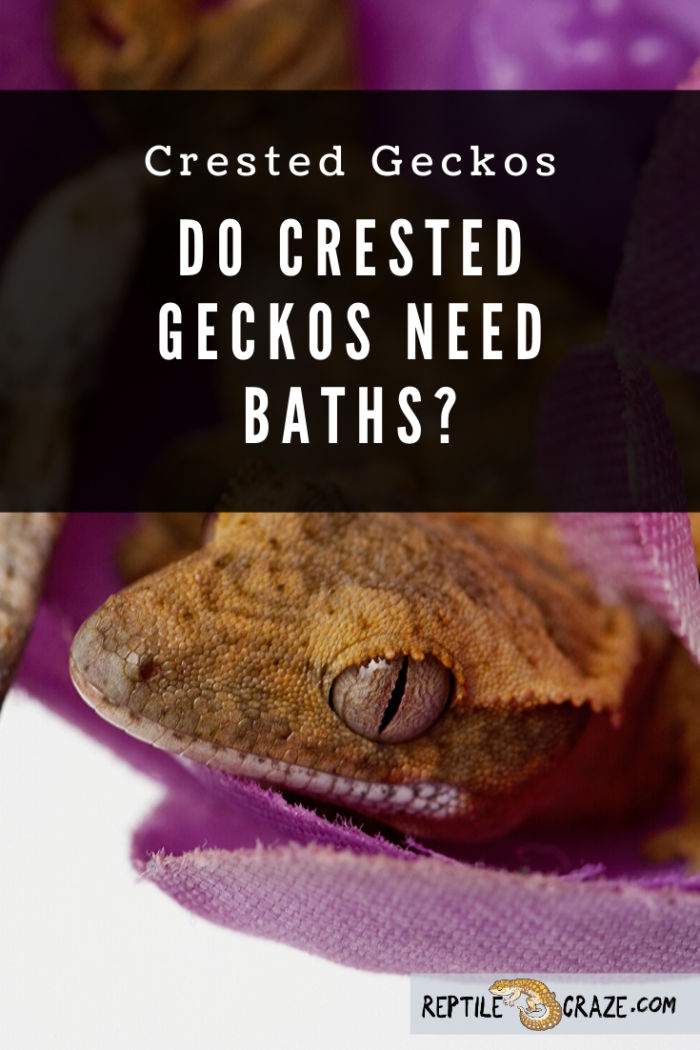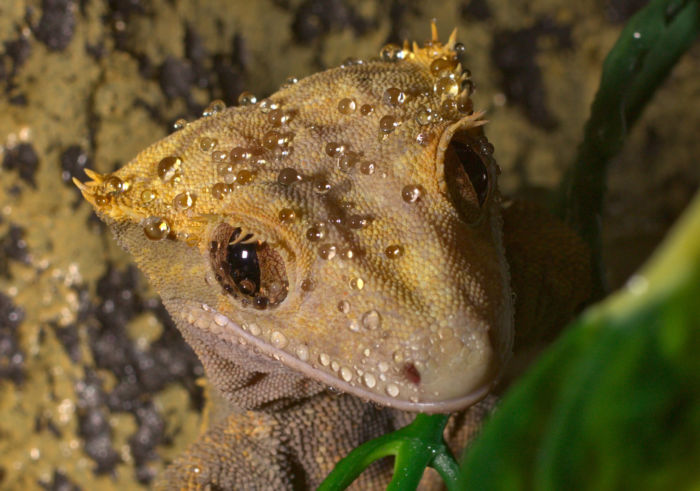 Considering my love for reptiles, when one of my friends gifted me a Crested Gecko, I was extremely happy.
Considering my love for reptiles, when one of my friends gifted me a Crested Gecko, I was extremely happy.
But soon after, I felt worried, wondering whether to bathe it or not. However, after consulting with other Crested Gecko owners and researching about raising Geckos, I have succeeded in taking proper care of my little reptile pet and have become quite a pro in this matter.
So, should you bathe your Crested Gecko? No, you shouldn’t bathe your Crested Geckos as they hardly need baths. Maintaining a correct humid environment is enough. By bathing your Crested Gecko, you’ll be inflicting stress on it. However, there can be situations when giving a sauna to your Gecko can help, especially when they get overheated.
Crested Geckos are known for being easy-to-care and interesting pets. One of the primary reasons for them being an extremely low-maintenance pet can be the fact that they need not be bathed. Like most reptiles, Crested Geckos are blessed with inherent cleanliness.
However, there might be situations when your Geckos need to be given a ‘sauna’ i.e. a steam bath but never an actual bath with pouring water on them. Read on to know in detail about bathing your Crested Gecko.
Why your Crested Gecko doesn’t need typical bathing?
It may sound strange to you that your pet doesn’t need to be bathed. But when it’s a Crested Gecko you’re talking about, know that they rarely need a bath. Not bathing your Crested Gecko won’t hurt it, but over-bathing it surely will.
Crested Geckos being arboreal reptiles, they don’t like water and are not prepared for deep water swimming. Rather, forcing to bathe your Geckos the way you do other pets like cats and dogs, can stress it and when left in deep water can cause it to drown.
Crested Geckos do not at all enjoy being in water which can be a solid reason for not bathing them.
Plus, Crested Geckos come with inherent cleanliness like the majority of the reptiles which makes normal bathing all the more needless. Throughout their entire life, Crested Geckos shed their skin as they grow.
While a young Gecko sheds once in every two weeks, an adult or grown-up Crested Gecko sheds once in every month. Since they get new skin every once in a while, there is no need for bathing them, at least for keeping them clean.
What type of bathing is ideal for Crested Geckos?
Normal bathing is neither recommended nor is needed for Crested Geckos. However, a sauna can be given to your Gecko if and when needed. A sauna for Crested Gecko is using a very little amount of standing water to hydrate its skin.
The standing water that is used in giving your Crested Gecko a sauna bath is used more for increasing the humidity inside its habitat than actually literally soaking it.
While giving your Crested Gecko a sauna bath, remember not to use water that is too hot or even too warm since these reptiles can have heatstroke or be easily harmed when exposed to a high temperature i.e. above 80o to 85oF.
What are the situations when your Crested Gecko may need a sauna?
There can be different situations when your Crested Gecko might need a sauna bath. Let’s take a look at some of such situations here:
To prevent shedding issues:
Shedding is natural for any reptile and Crested Geckos tend to shed all at once.
Though with proper diet, terrarium humidity and temperature, Crested Geckos can easily shed their skin; still, sometimes things go wrong and bits and pieces of the skin they try to shed can get stuck all over their body.
When your Crested Geckos experience a bad shed, know that they need your help with helping them to get rid of those stuck skin which may constrict their blood flow leading to a loss of the tail’s tip, the toes or even an entire foot.
Not having adequate moisture can cause juvenile and hatchlings Crested Geckos’ skin to dry out quickly, resulting in a bad shed.
Every time your Crested Geckos have a stuck shed on its tails or toes, saunas can be given to your pet to help it shedding the stuck skin. A sauna not only helps with hydrating their skin but also prevents their skin from drying out which makes peeling of the shed skin easy.
To deal with body overheating:
Crested Geckos come from a habitat that is usually warm. Hence, when kept in captivity, they do well in a terrarium that has a lukewarm temperature.
As long as the temperature inside the terrarium stays below 78oF (26oC), Crested Geckos don’t have any issues. You need to make sure that the temperature never gets above the average temperature.
Even during the night, if the temperature goes down a bit, it doesn’t harm the Gecko as long as it stays above 65oF.
But, if the temperature inside the terrarium rises above 78oF, then these reptiles find it hard to tolerate the temperature which then gets too hot for them. It can not only make them extremely stressed but also can cause them to suffer from heatstroke.
And it is to control their body-temperature or prevent heatstroke, that you can give your crested Gecko a sauna or soak it.
To restore stickiness and remove food debris:
Another situation when a sauna may seem ideal for your Crested Geckos can be when there are food debris stuck on the toes of your pet that they are unable to get rid of.
Giving them sauna in such scenarios help them to remove any remaining food debris along with restoring the stickiness of their tails and toes.
Remember, Crested Geckos don’t enjoy even the sauna process and hence you should go for it only if necessary. Maintaining a moist and clean habitat for your Crested Gecko is always the best option over giving it a sauna for cleaning its toes or hydrating its skin.
How to Give Sauna to your Crested Gecko?
Giving your Crested Gecko a sauna is not only extremely simple but can prove to be beneficial to its overall health as well. Below are some step-by-step instructions for giving your Crested Gecko a sauna.
First, take a container of rectangular shape and medium size, with a lid that has holes in it.
Then take some lukewarm water along with some crumpled tissues or paper towels.
Place the tissues at the bottom of the container and add a small amount of lukewarm water. The amount of water taken needs to be such that the Crested Gecko doesn’t end up drowning in it. Remember, you need water only as much to make the paper towels wet and not to create a puddle.
Put your Crested Gecko inside the container (one at a time, in case you have more than one Crested Gecko at home) and spray mist on top of it.
Then close the lid and leave it there for a few minutes (15 to 20 minutes’ maximum) and cover the container with a lead. But make sure to never leave a Crested Gecko unattended during a sauna.
Then open the lid, and gently remove your Gecko from the container.
After taking your Gecko out from the container, gently rub the shed skin off that’s still stuck on the toes and tails or other body parts of your Crested Gecko with the help of a Q-tip.
When giving your Crested Gecko a sauna bath, make sure the water you add in the tissues inside the container isn’t too warm but cool, unlike a real sauna.
Since human body temperature is higher than that of a Crested Gecko, water that feels cold to human skin may be very hot for a Gecko. Hence, always keep the temperature of water used for giving a sauna to your little pet friend below 85 degrees.
Related Questions
Can Crested Geckos swim in the water? Crested Geckos can swim but whether they want to or enjoy swimming or not that’s a different story. When thrown in the water, or compelled to swim they can swim. But being arboreal reptile species, swimming isn’t their natural behaviour and physically Crested Geckos aren’t made for swimming.
Is it easy to care for Crested Geckos? Crested Geckos are extremely low-maintenance pets and easy to care for. They aren’t only extremely hardy but also spend most of the day sleeping which makes caring for them very easy. Plus, they rarely require a bath, don’t long for companionship, can be left alone and eat normal commercial diet.
Which color light to use to view Crested Geckos at night? Crested Geckos are nocturnal lizards. Therefore, when it comes to watching the activities of your Crested Geckos during the night when they are most active, without disturbing them, black or blue light is the best. Avoid using red light as they can see it easily due to being tetra-chromatic.
No comments:
Post a Comment